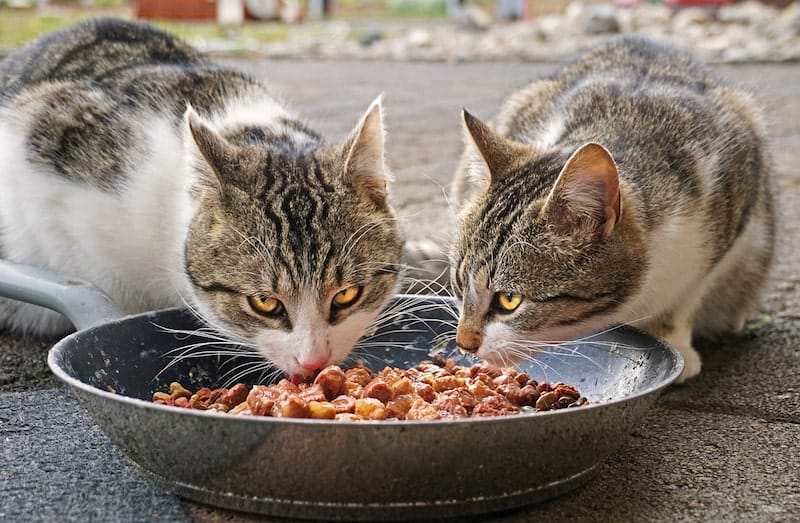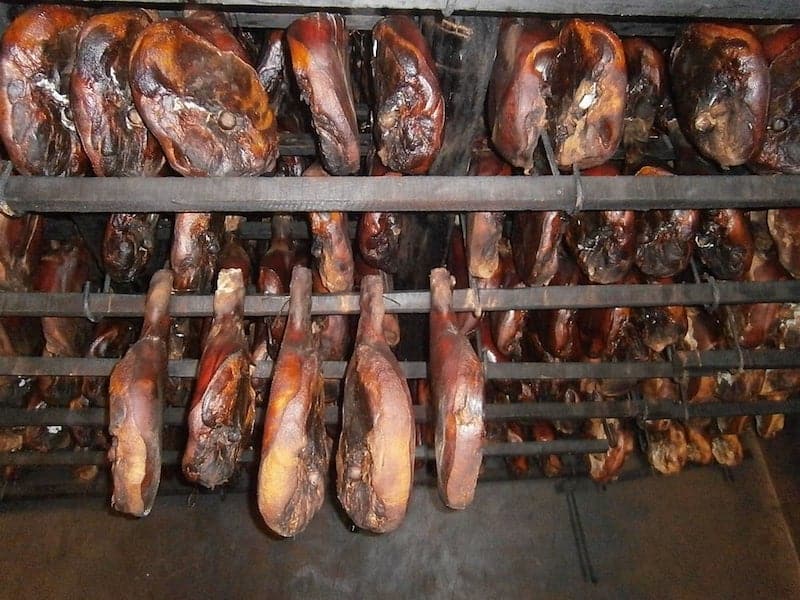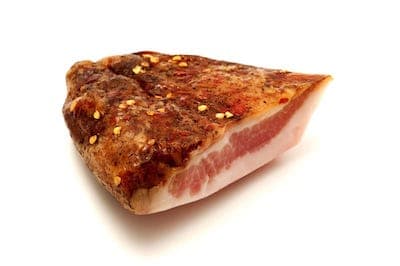Can Cats Eat Prosciutto? (Solved!)
Like humans, cats have different nutritional requirements, and there isn’t a single food that can satisfy all of those needs. Placing your cat on a strict diet of just a few types of food can lead to malnutrition and digestive distress.
That said, cats are obligate carnivores and need a lot of protein. One good source of protein is prosciutto – a type of Italian ham that has been aged by hanging it in dry air.
This begs the question: can cats eat prosciutto?
Prosciutto can be a great occasional treat for your cat. However, it shouldn’t be included as part of their everyday diet. It shouldn’t replace wet food or dry kibble.
In this article, I’m going to explain why prosciutto is unsafe for your cats. We’ll also look at the types of meat your cats should never eat.
Can Cats Eat Cured Meat, Like Prosciutto?
Cats have a reputation as fussy eaters. They can be picky about what they eat.
Nevertheless, they still need a balanced diet. For this reason, you need to give them all three macronutrients – proteins, lipids (fats), and carbohydrates. As obligate carnivores, cats need a lot of protein in particular.
If you’re wondering whether cats can eat cured meat, the answer is yes and no. Cured meat, like prosciutto, has several characteristics that can help get your cat’s nutritional requirements right.
But at the same time, it can also be harmful, especially if eaten in large quantities.
Why Cats Can Eat Cured Meat
Cured Meat Has Nutrients
First, cured meat is packed with a wide range of nutrients that can help you keep your furry friend in optimal health. It has essential amino acids that can help your cat build muscle and maintain stabilized moods. Cured meat is also rich in vitamins and minerals, including iron, zinc, thiamine, phosphorous, vitamin B6, and vitamin B12.
In addition, cured meat helps keep your cat’s teeth and bones healthy and strong. Cats are naturally playful animals that will spend a lot of time jumping around the house and playing with their human friends. Feeding your cat prosciutto and other types of cured meat ensures that your cat’s bones are strong enough to support and sustain its usual behavior.
Finally, most cured meat products have between 5%-7% fat or less, making them lower in saturated fats than fresh meats. As a result, they can help to keep your cat’s weight in check.
Cured Meat Has a Long Shelf-life
Cured meat, like prosciutto, also has a long shelf life. It can be the perfect food supplement if you don’t want to go to the local food store several times a week.
Cured meat is treated to last a good while, primarily by adding salt and sometimes nitrates or nitrites.
The shelf life varies according to the type of meat. For example, cured pork meat can last up to 6 weeks without refrigeration. The finished product usually contains around 12%-14% moisture.
Why Cats Shouldn’t Eat Cured Meat
Cured Meat is High in Salt
On the downside, cured meat can be very salty. If cats take prosciutto in large amounts, they risk overworking their bodies as major organs such as the kidney fight to eliminate the excess salt.
This can lead to dehydration, reduced blood pressure caused by excess fluids washing through their bloodstreams, and an increased heart rate due to fluid retention.
If your cat already has kidney or renal disease, your vet will most likely recommend skipping cured meat treats altogether.
Cured Meat isn’t Cooked
The fact that cured meat like prosciutto isn’t actually cooked means there’s always the risk of contamination by harmful bacteria.
Two of the most dangerous bacteria are Salmonella and Escherichia coli. Chronic infections with these bacteria can lead to severe life-threatening illnesses in cats, typically manifesting as diarrhea and lymph node swelling under the forelimbs. In addition, chronic infection is usually characterized by significant weight loss, dehydration, fever, and lethargy.
Although curing kills any parasites lurking in meat, poor handling procedures can make them creep back in. Intestinal parasites, such as tapeworm, hookworm, and roundworm, pose the most significant risk for your feline friend.
The good thing is that you can keep them at bay by observing strict hygiene and freezing the meat before feeding it to your cats. Purchasing the meat only from reputable sources can also help.
Cured Meat is Spicy
Additionally, cured meat can be pretty spicy. For example, prosciutto is often cured in juniper, pepper, and garlic.
Although spices are generally not associated with severe health issues in cats, they can cause stomach upsets. In the same vein, some spices are more dangerous than others.
For example, garlic is known to destroy red blood cells in both cats and dogs.
To be on the safe side, always ensure that you scrutinize the ingredients used to cure your prosciutto before feeding it on your cat. Prosciutto cured using plain salts is better than one cured in spices.
What Meat Should Cats Never Eat?
Meat should be your cat’s primary diet because they need high protein and low carbohydrates.
However, they’re also obligate carnivores, meaning that while they may comfortably enjoy other things like grass or milk, their digestive systems can’t process any plant-based foods. Thus, it’s best to keep them away from anything but meat-based food sources.
In addition, your cat shouldn’t have more than 10% of its diet from carbohydrate sources such as fruits and vegetables. If it does, the additional sugar content could lead to diabetes or obesity.
This brings us to the question: is there any meat that your cats should never eat? The answer is yes.
Cats are naturally curious and will happily accept just about any meat you present them. However, not all types of meat are good for them.
Here are the meat varieties that should never be on your cat’s plate.
Fish
A lot of cats get excited at the sight of fish. However, fish is hazardous for your kitties.
For starters, fish has too many bones that could cause digestive issues or even an obstruction in their intestines.
Fish-based foods also contain high amounts of histamine, a protein known for triggering allergies in cats.
In addition, those at the top of the food chain – such as tuna and salmon-have elevated toxins and heavy metals, including mercury. Predatory fish are so dangerous that the FDA advises children and women of child-bearing age to avoid them entirely.
Raw Meat
The smell of raw meat can tempt even the most steadfast cat, but you should avoid feeding it to your feline friend. Eating raw meat can lead to severe neurological issues that may include seizures and intense lethargy.
In addition, raw eggs and meats contain harmful microscopic organisms such as Salmonella or E. coli, which may cause food poisoning in cats.
Raw meats also have enzymes that can destroy B vitamins like thiamine, which gives cats energy for movement and neurological function. A lack of these nutrients can also lead to vomiting and diarrhea.
In Summary
So, can cats eat prosciutto? The answer isn’t straightforward.
On the one hand, prosciutto is a delicious, salty meat that can spice up your cat’s meal. But, on the other, prosciutto may contain high levels of toxic bacteria that can cause extreme illness. So, what’s the bottom line?
Cured meat, like prosciutto, could be a great occasional treat for your cat, but it shouldn’t be used as an everyday meal. The biggest concern with feeding your cats cured meat is the high sodium content that can lead to dehydration and low pressure.
Always be sure to talk with the vet before offering prosciutto or other cured meats. Then, to be on the safe side, start small and closely monitor how they react.








